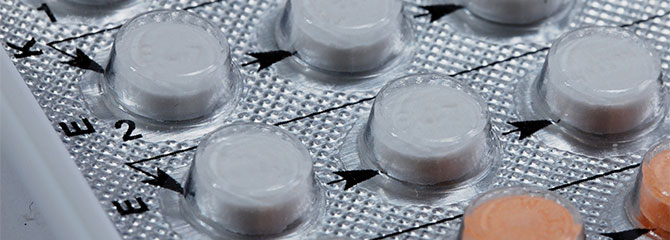Hormonal Therapy

Hormones, especially estrogen, play a variety of roles in the female body, particularly in relation to female characteristics, sexual functioning, and pregnancy. Hormones termed progestins are used alone, or in combination with estrogen, in oral (birth control pills) and other hormonal contraceptives. High doses of estrogen may increase blood clotting factor levels. Hormonal contraceptives used today do not generally increase factor levels, but are effective in treating heavy periods (menorrhagia) by their effect on the ovaries and the lining of the uterus. Hormonal contraception that contains both estrogen and a progestin are also effective in decreasing bleeding from cysts in the ovaries. Estrogen therapy may also be prescribed to treat the symptoms of menopause and osteoporosis.
Understanding the effects of hormones is important for all women who wish to actively participate in their own health care—but it is particularly critical for women with bleeding disorders, such as von Willebrand disease (VWD). This is because hormonal contraception is effective in treating some of the most common bleeding symptoms, including heavy menstrual periods.
Here are some common estrogen-containing treatments of importance to women with a bleeding disorder.
Bleeding Disorders and Birth Control
Because hormonal therapies, including birth control pills and certain progesterone-coated intrauterine devices (IUDs), are sometimes prescribed to control heavy periods in women with bleeding disorders, speak with your healthcare provider (HCP) or Hemophilia Treatment Center (HTC) team to find out if hormonal contraceptives are an option for you. For women who cannot tolerate hormonal therapy, oral tranexamic acid, or for women with von Willebrand disease (VWD) or mild hemophilia A, intranasal desmopressin acetate (DDAVP), are additional options for treating heavy periods.
Hormone Replacement Therapy
Hormone replacement therapy (HRT) is sometimes used in women who experience early menopause or who have severe symptoms during menopause. Estrogen, sometimes in combination with progesterone or a progestin, has been shown to increase the risk of heart attack, stroke, blood clots, and breast cancer. But it can also offset potential health problems related to menopause. You should thoroughly discuss the benefits and risks of HRT with your health care provider or Hemophilia Treatment Center (HTC) team.
